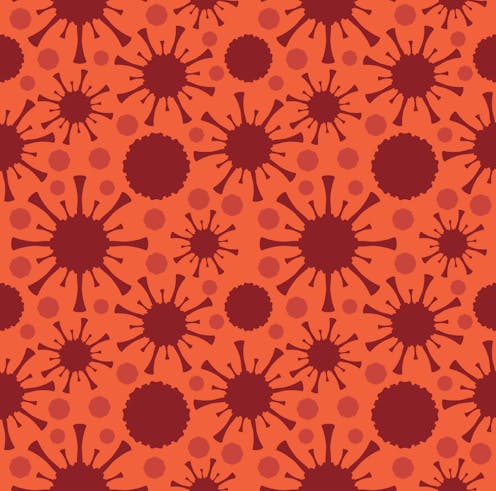Can 'viral shedding' after the COVID vaccine infect others? That's a big 'no'
- Written by Peter Wark, Conjoint Professor, School of Medicine and Public Health, University of Newcastle

Fears of “viral shedding” and other concerns after the COVID vaccine has led some businesses to ban vaccinated customers from the premises, believing vaccination poses a health risk to others.
We’ve seen this in Australia[1], in the northern New South Wales town of Mullumbimby and on the Gold Coast in Queensland. We’ve also seen this[2] internationally[3].
In the United States, a teacher warned her students[4] not to hug their vaccinated parents for the same reason.
But COVID vaccines don’t contain any live virus to shed. Here’s the science to put the myth of viral shedding after the COVID vaccine to bed.
What is viral shedding anyway?
People can shed (or release) virus after a viral infection, such as SARS-CoV-2, the virus that causes COVID-19.
If people are infected, they can shed virus via their respiratory secretions when they cough and sneeze. During the pandemic, that’s why we socially distance, wear masks and stay at home if we’re sick. We can only infect someone if the virus is live.
Read more: We don't know for sure if coronavirus can spread through poo, but it's possible[5]
Some vaccines for other diseases contain live viruses that have been weakened (or attenuated[6]). Examples are vaccines against measles, rubella, mumps and herpes zoster (shingles).
These train your body to mount an immune response with a version of the virus that isn’t so dangerous.
For example, with the very effective vaccine against herpes zoster (shingles), there is a very small risk the weakened virus can cause infection. However, this happened in less than[7] 1% out of more than 20,000 people vaccinated over a ten-year period. The majority of people infected this way had a weakened immune system.
Read more: Explainer: how do you get shingles and who should be vaccinated against it?[8]
COVID vaccines don’t contain live virus to shed
However, none of the COVID vaccines approved for use anywhere around the world so far use live virus.
Instead, they use other technologies to train our bodies to recognise SARS-CoV-2 and to mount a protective immune response should we ever be exposed to it.
For instance, the AstraZeneca vaccine is a viral vector vaccine[9]. This uses a modified chimpanzee virus to carry into the body the genetic instructions to produce the SARS-CoV-2 spike protein. Your body then uses these instructions to make the spike protein, and to raise a protective immune response.
The Pfizer vaccine is an mRNA vaccine[10], which contains the genetic material to code for the spike protein. Once inside your cells, your body uses those instructions to make spike protein, again raising a protective immune response.
Read more: What's the difference between viral shedding and reinfection with COVID-19?[11]
COVID vaccines[12] don’t give you the disease or give you a positive COVID test. Again, they don’t contain live virus. They contain fragments of spike protein or the instructions on how to make it.
Even if you could shed spike protein after vaccination, that wouldn’t be enough to cause an infection. For that you need the entire virus, which the vaccines don’t contain.
And the mRNA in the Pfizer and Moderna vaccines is very short-lived[13], and is quickly degraded in our cells. Again, the mRNA wouldn’t be enough to cause an infection. It would need to be packaged inside a live virus, which our vaccines don’t contain.
Vaccinated people are likely ‘safer’
Rather than banning vaccinated people from businesses for fear of viral shedding, owners should be welcoming them with open (socially distanced) arms.
That’s because evidence is mounting vaccinated people are less likely[14] to transmit SARS-CoV-2 to others.
In England, people who became infected despite being vaccinated with either the Pfizer or AstraZeneca vaccines (known as a breakthrough infection), were only half as likely[15] to pass their infection on to household contacts compared to infected people who were not vaccinated.
In Israel, people who had a breakthrough infection after the Pfizer vaccine had less virus[16] cultured from their nose than people who had not been vaccinated.
Read more: Mounting evidence suggests COVID vaccines do reduce transmission. How does this work?[17]
So there’s no chance, then?
Zero, zip, nada. There’s no chance of viral shedding as a result of your COVID vaccine. If you do need to go to the shops in an outbreak area, follow the health advice to wear a mask and socially distance.
If you’re vaccinated, you’re likely to pose less risk to others than if you’re unvaccinated. So businesses should be wooing you rather than turning you away.
References
- ^ seen this in Australia (thenewdaily.com.au)
- ^ seen this (globalnews.ca)
- ^ internationally (coronavirus.nautil.us)
- ^ warned her students (www.nytimes.com)
- ^ We don't know for sure if coronavirus can spread through poo, but it's possible (theconversation.com)
- ^ or attenuated (www.nature.com)
- ^ less than (www.sciencedirect.com)
- ^ Explainer: how do you get shingles and who should be vaccinated against it? (theconversation.com)
- ^ viral vector vaccine (www.nature.com)
- ^ an mRNA vaccine (www.mdpi.com)
- ^ What's the difference between viral shedding and reinfection with COVID-19? (theconversation.com)
- ^ COVID vaccines (theconversation.com)
- ^ very short-lived (theconversation.com)
- ^ less likely (theconversation.com)
- ^ half as likely (www.nejm.org)
- ^ less virus (www.nature.com)
- ^ Mounting evidence suggests COVID vaccines do reduce transmission. How does this work? (theconversation.com)

















